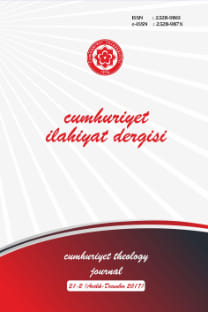Din Dilinin Ahlâkî Yorumu
Braithwaite, konatif, ahlak, işlevselcilik, din dili
Moral Interpretation Of Religious Language
Braithwaite, conative, ethics, functionalism, religious language,
___
- Alston, William P. Philosophy of Language. New Jersey: Printice-Hall Inc., 1964.
- Bartley, William Warren. Morality and Religion. London: Macmillan St. Martin’s Pr, 1971.
- Blackstone, William T. Dinsel Bilgi Sorunu. Tuncay İmamoğlu (çev.). İs- tanbul: Ataç Yayınları, 2005.
- Braithwaite, Richard Bevan. “An Empiricist's View of the Nature of Reli- gious Belief”. The Philosophy of Religion. London: Oxford Uni- versity Press, Basil Mitchell (ed.). 1971.
- Donovan, Peter. Religious Language. London: Sheldon Press, 1985.
- Ferre, Frederick. Din Dilinin Anlamı. Zeki Özcan (çev.). İstanbul: Alfa Basın Dağıtım, 1999.
- Greisch, Jean. Wittgenstein’da Din Felsefesi. Zeki Özcan (çev.). Bursa: Asa Kitabevi, 1999.
- Harris, James F. Analytic Philosophy of Religion. London: Kluwer Academic Publishers, 2002.
- Hick, John. An Interpretation of Religion-Human Response to The Transcend- ent. London: Macmillan Pr., 1989.
- Koç, Turan. Din Dili. İstanbul: İz Yayıncılık, 1998.
- Mitchell, Basil (Ed.). The Philosophy of Religion. London: Oxford University Press, 1971.
- Schedler, Norbert O. Philosophy of Religion–Contemporary Perspectives. New York: Macmillan Pub., 1974.
- Sharma, Arvind. The Philosophy of Religion and Advaita Vedanta. Pennsyl- vania State University Press, 1995.
- Wainwright, William J. Religion and Morality. Burlington: Ashgate Pub- lishing Co., 2005.
- ISSN: 2528-9861
- Yayın Aralığı: 2
- Başlangıç: 1996
- Yayıncı: Cumhuriyet Üniversitesi İlahiyat Fakültesi
SÜNNETiN KUR'AN'I BEYAN YÖNLERİ
Yükselen Çevre Bilinci ve Klasik Delillerin Yeniden Tasnifi
Cibril Hadisi ve Eğitsel Değeri
DİN PSİKOLOJİSİNDEKİ METODOLOJİK KAYGILAR: 'Değişmeyenler, Değişenler ve Dönüştürücü Perspektifler'
Jacob A.BELZEN, Beyazıt Yaşar SEYHAN
Nefs-Mead İlişkisi Bağlamında Farabi Ve İbn Sina’nın Görüşlerinin Karşılaştırılması
KUR' ANlN DUYGULARI EĞİTMESİ BAĞLAMINDA ÖFKENİN KONTROLÜ MESELESi
